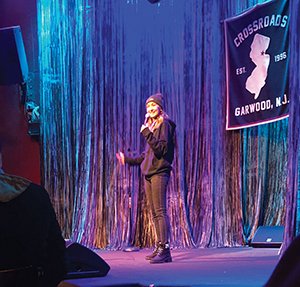By Alison Laurio

Every year for the last three years, Kaitlin Nichols, MSW, LCSW, has traveled to Edinburgh, Scotland, for the International Fringe Festival, which she said began in the 1970s.
“People submit plays and do comedy. It started on the fringes of a main festival, and there’s a lot of avant-garde stuff, a lot of creativity. There are people there from all over the world. There are folks with all kinds of accents and backgrounds, mainly English-speaking. It runs the whole month of August.
“Maybe,” she said, “I’ll go back there next year.”
Pictured right: Nichols is a psychotherapist with a private practice in New Jersey. She says her improv and standup hobby allows her to be flexible, evolve and make people laugh.
Why Comedy?
Nichols, MSW, LCSW, performs standup comedy. She has a private practice, Cycle Breakers Therapy, and she provides online therapy for New Jersey residents.
“I always enjoyed making people laugh,” she said. “I grew up in a funny family, and when I was a kid, I loved being silly andmaking people laugh.”
After her mother died unexpectedly, Nichols said creating laughter is what kept her going.
“It helped me learn the importance of doing what makes you happy, and it was a big part of how I processed my grief. It really informed me and gave me a shared life experience that many people have. (My mother is) such a big part of what I am. She had her own struggles with mental health, and what helped her cope was leaning into her passions and creativity. She ran her own catering company and party-planning company, and she was a very funny person. She loved to connect with people, so I think I learned that from her.”
Why Standup and Improv?

“After I graduated and had my first job, I had a little free time and a little bit of expendable income, so I took an improv class. I loved it!” she said. “I had a good time and I made a lot of friendships from the class. Some friends from the class started doing standup, and I had always wanted to try doing standup as well, so I really pursued that.”
Pictured: Nichols performs at the FM Lounge in Jersey City, N.J.
“It helped me get out of my own head and feel fully present and plugged in and connected,” she added. “It really pushed me. Comedy helped me learn the importance of doing what makes you happy.”
Lessons Learned
“Some of the biggest lessons are around trusting myself,” Nichols said. “With improv and standup you can try something out and maybe it works, maybe it doesn’t, but you’re learning to be flexible and evolve. When you’re flexible, you’re growing and learning and exploring.”
“Improv is spontaneous,” she said. “A standup set is organized, planned. Standup is solo; you’re up there with the microphone on your own. Whenever you do improv, you often have a partner to do characters with. You can create scenes or play a game that’sfully spontaneous and on the spot.”
Why Social Work?
Nichols took a social work class as an elective when she was a college liberal arts major.
“I didn’t know what to do,” she said. “When I took that class, I fell in love with the ideology in social work, the understanding of people within a large system. Individuals in larger frameworks influence us all the time. I continued with it, and I knew I wanted to do something with other people and help someone out and feel a little bit less alone.”
“I have a private practice as a psychotherapist and also do some freelance work with an employee assistance program at a community school.”
Similarities Between Social Work and Comedy

“I believe with social work and comedy it’s people trying to make sense of our experiences,” Nichols said. “It’s trying to understand ourselves and others and the world we live in. In a therapy session, people try to figure out what actually is happening. On stage, people doing comedy try to make sense of their own life experience and the world around them, so it really comes down to the same core mission.” Pictured at right: Kaitlin Nichols performs at Crossroads in Garwood, N.J.
She said comedy has informed her work. She has an Instagram account and makes funny videos with mental health content.
“One is if everybody in New Jersey went to therapy,” Nichols said. “It has two people and a road rage altercation thing. Using self-aware language, they end up apologizing to each other at the end.”
Both social work and comedy also involve being present with other people and responding in the here and now, she said.
“A therapist is with the other person, responding in the here and now with a client. With comedy, the other people are also present in the room and responding to you being in the room.”
“With both, you’re hearing and seeing each other and you have to be open minded and flexible and responsive and think on your feet,” Nichols said.
What’s Next?
Nichols plans “to continue to see folks in my private practice and continue to work the comedy circuit.”
“Long term, I’d maybe like to do a show at the Fringe Festival and I want to continue to grow my practice and I want to reach more people, both in my practice and in my performances.”
Visit Kaitlin’s website